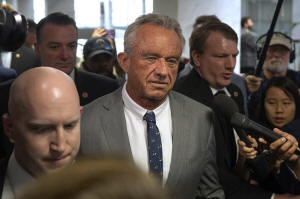Dismissed members of CDC vaccine committee call Kennedy's actions
'destabilizing'
[June 17, 2025]
By MIKE STOBBE
NEW YORK (AP) — All 17 experts recently dismissed from a government
vaccine advisory panel published an essay Monday decrying “destabilizing
decisions" made by U.S. Health Secretary Robert F. Kennedy Jr. that
could lead to more preventable disease spread.
Kennedy last week announced he would “retire” the entire panel that
guides U.S. vaccine policy. He also quietly removed Dr. Melinda Wharton
— the veteran Centers for Disease Control and Prevention official who
coordinated the committee's meetings.
Two days later, he named eight new people to the influential panel. The
list included a scientist who criticized COVID-19 vaccines, a leading
critic of pandemic-era lockdowns and someone who worked with a group
widely considered to be a leading source of vaccine misinformation.
“We are deeply concerned that these destabilizing decisions, made
without clear rationale, may roll back the achievements of U.S.
immunization policy, impact people’s access to lifesaving vaccines, and
ultimately put U.S. families at risk of dangerous and preventable
illnesses,” the 17 panelists wrote in the Journal of the American
Medical Association.
The new committee is scheduled to meet next week. The agenda for that
meeting has not yet been posted, but a recent federal notice said votes
are expected on vaccinations against flu, COVID-19, HPV, RSV and
meningococcal bacteria.
In addition to Wharton's removal, CDC immunization staff have been cut
and agency experts who gather or present data to committee members have
resigned.

One, Dr. Lakshmi Panagiotakopoulos, resigned after 12 years at CDC,
disclosing her decision early this month in a note to members of a
COVID-19 vaccines workgroup. Her decision came after Kennedy decided —
without consulting the vaccine advisers — to pull back COVID-19
vaccination recommendations for healthy children and pregnant women.
“My career in public health and vaccinology started with a deep-seated
desire to help the most vulnerable members of our population, and that
is not something I am able to continue doing in this role,” she wrote in
a message viewed by the AP.
[to top of second column]
|

Robert Kennedy Jr., center, President-elect Donald Trump's
pick to lead the Health and Human Services Department, walks between
meetings with senators on Capitol Hill, Tuesday, Dec. 17, 2024, in
Washington. (AP Photo/Mark Schiefelbein, File)
 Those CDC personnel losses will make
it hard for a group of new outside advisers to quickly come up to
speed and make fact-based decisions about which vaccines to
recommend to the public, the former committee members said.
“The termination of all members and its leadership in a single
action undermines the committee’s capacity to operate effectively
and efficiently, aside from raising questions about competence,”
they wrote.
A spokeswoman for the U.S. Department of Health and Human Services
did not respond to the JAMA commentary, but instead pointed to
Kennedy's previous comments on the committee.
Kennedy, a leading voice in the anti-vaccine movement before
becoming the U.S. government’s top health official, has accused the
committee of being too closely aligned with vaccine manufacturers
and of rubber-stamping vaccines.
The Advisory Committee on Immunization Practices, created in 1964,
makes recommendations to the CDC director on how vaccines that have
been approved by the Food and Drug Administration should be used.
CDC directors almost always approve those recommendations, which are
widely heeded by doctors and guide vaccination programs.
ACIP policies require members to state past collaborations with
vaccine companies and to recuse themselves from votes in which they
had a conflict of interest, but Kennedy has dismissed those
safeguards as weak.
All contents © copyright 2025 Associated Press. All rights reserved
 |